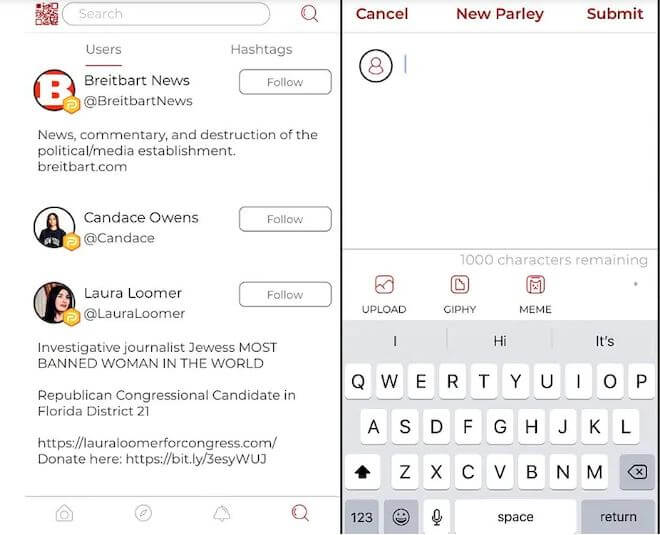Parler was the most downloaded app in the Google and Apple stores in the United States over the days following Donald Trump’s election loss. Its user base expanded eight-fold to roughly 8 million users.
Parler was suspended from the app stores on 9 January and on Sunday was booted from Amazon Web Services, taking it off the internet for the next several months at a minimum. Though the platform is now no longer accessible, reports from those who checked in before the ban can tell us a lot about the decision to sever relations with it.
What is Parler?
Parler was founded in 2018 and markets itself on its homepage as an app that allows its users to “speak freely” without fear of being “de-platformed.” This is a clear nod to the idea of “political correctness gone mad,” as if homophobia, racism and misogyny were central pillars of liberté, égalité, fraternité. Parler “gets what free speech is all about,” in the words of coup agitator Ted Cruz. George Christensen and Cory Bernardi were also on Parler.
Of course, Twitter and Facebook don’t actually ban people for branding themselves “patriots” or slapping a flag or a red hat on their profiles. Posting harmful misinformation – about, say, a deadly pandemic or the result of an election – does get you banned.
The app was intended to pick up those disenchanted with mainstream social media apps for this very reason. #Twexit was one of its earliest trending hashtags.

Needless to say, some people who have a big enough problem with the filtering of discriminatory content on Facebook and Twitter to actually leave those platforms are people wanting to promote that kind of content. This means that these fringe platforms like Parler end up becoming filled with appalling content from the perspective of the average person.
According to reporter Jilian Goltzman, who got onto Parler before the ban, suggested hashtags upon sign up included #DemocratCorruption and #SaveTheRepublic. Suggested users include Republican congresspeople, right-wing news organisations and conservative commentators. Goltzman describes the Parler fan base as a “battalion of social media misfits, curious conservatives, and blatant white supremacists joining under one app.”
From the initial suggestions, browsing through popular hashtags like #Trump2020 and #AmericaFirst quickly leads to white nationalist and neo-Nazi content. Links are available to external Discord servers along with other sites like Bitchute whose lack of moderation standards means such links are banned on sites like Twitter. Thus, a Trump hashtag can quickly lead to a “Holocaust revisionism” conspiracy.
The claim that this is all merely out of respect for free speech is arguably implausible; there is no such thing as a value neutral position when it comes to speech acts. This is all the more clear when you look at the history of Parler. The platform has banned liberal accounts – it reserves the right to ban users “for any reason” – and shows its conservative moralism by prohibiting words like “poop” and “balls.”
While it may seem vaguely funny, Parler hosts some of the most intense militia, white supremacists and QAnon conspiracists in the US, according to the Anti-Defamation League. The Proud Boys had over 200,000 followers on the platform. And they were, of course, the go-to platform for the organisers of the coup attempt at the Capitol. Given platforms have to draw the line somewhere, it’s a relief that Twitter, Facebook and Amazon Web Services have stood up for common decency in the case of Parler.
If you enjoyed this article, you can follow Christian on Twitter.